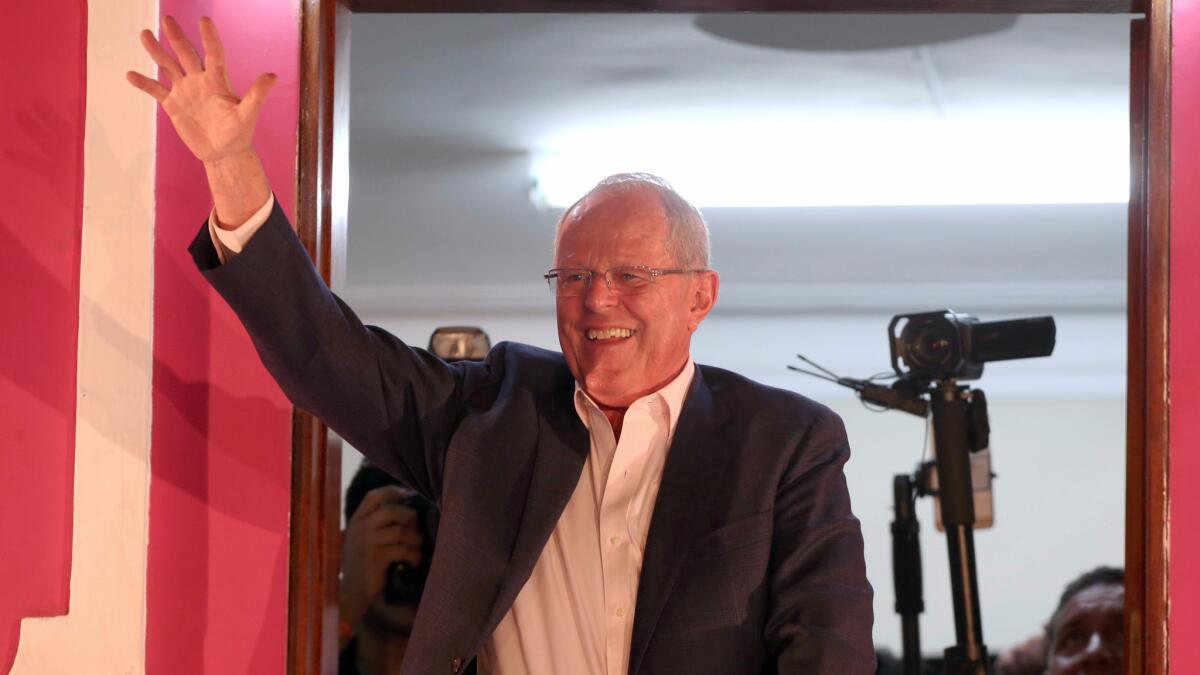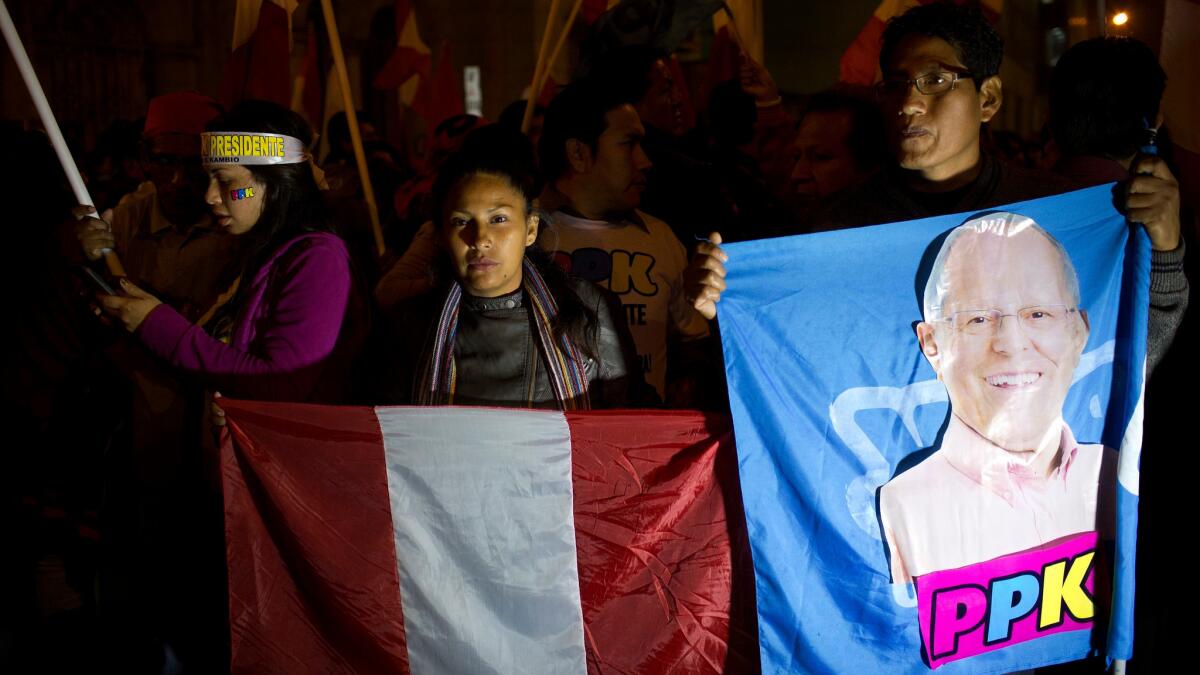Alberto Fujimori’s dark legacy lingers as Peruvians reject his daughter’s bid for president

- Share via
Reporting from LIMA, PERU — Both candidates ran similar campaigns, promising to wage war on crime and protect one of Latin America’s strongest economies. But in the end Peruvians chose an avuncular technocrat known as PPK for their new president rather than take a chance on a candidate with a toxic last name.
Pedro Pablo Kuczynski, a 77-year-old former finance minister with Oxford and Princeton degrees, on Thursday was finally declared the winner of Peru’s closely disputed presidential contest, squeaking out the narrowest of victories over Keiko Fujimori, 41-year-old daughter of disgraced former President Alberto Fujimori.
With 100% of ballots counted, Kuczynski garnered 50.12% of the vote versus Fujimori’s 49.88%. His victory margin was only 41,000 votes out of 17 million cast.
It’s a remarkable comeback from the first round of presidential voting in April: In a seven-way contest, he won just 20% of the vote while Fujimori captured 40%.
“Thank you, Peru,” Kuczynski told a gathering at his campaign headquarters shortly after the election commission’s announcement. “Let’s not confuse dialogue with weakness. We will be decisive, but we will work for all Peruvians because many feel the train has passed over them and we want everyone to be on board.”
Balloting was held Sunday and the nation had been on edge awaiting the final results. On Thursday the election commission received the remaining votes from remote mountain areas, enabling it to declare Kuczynski the official winner.
NEWSLETTER: Get the day’s top headlines from Times Editor Davan Maharaj »
Despite her first-round victory, Fujimori could not overcome voters’ wariness about the influence of her imprisoned father and the perceived risk of a return to his authoritarianism and human rights crimes. Her repeated promises not to repeat his mistakes or pardon him didn’t sway enough voters, analysts said.
Kuczynski had not made any public statements leading up to the commission’s announcement. Pedro Spadaro, a congressman from Fujimori’s Fuerza Popular party, called a news conference Thursday to say that certain “irregularities” in voting locations and monitoring had been reported and should be reviewed.
Fujimori lost the presidency similarly in 2011 to Ollanta Humala, losing a runoff after outdistancing him and other candidates in the first round.
Fujimori’s father served as president from 1990 to 2000 but was forced to resign after bribery and arms trafficking scandals that brought down his spymaster Vladimiro Montesinos. Alberto Fujimori was later tried and convicted on corruption and human rights charges and is serving a 25-year prison sentence.

Especially damaging to Fujimori was a scandal in the campaign’s final weeks over the reputed connection of her close aide Joaquin Ramirez to a money-laundering scheme. The U.S. Drug Enforcement Administration issued a statement last month saying she was not being investigated, but a steady drumbeat of news reports probably cost her votes.
In addition, Kuczynski benefited from a key endorsement in the campaign’s final days from the third-place candidate in the voting in April, Veronika Mendoza, a charismatic, young socialist congresswoman who has galvanized opposition against big mining projects.
In addition to touting his economics background, Kuczynski promised to fight corruption and violent crime by reforming the judiciary and to remake the nation’s police force in a bid to tamp down violent crime. Police salaries will be increased as will the Interior Ministry’s budget, he said.
In the end, voters seemed to see him as the safer choice, a brilliant candidate with a long public record, said Shane Hunt, economics professor emeritus at Boston University and a longtime Peru analyst.
In addition to his stints as finance minister and World Bank economist, Kuczynski also was Cabinet chief during the Alejandro Toledo administration (2001-06) and energy and mining minister under President Fernando Belaunde Terry (1980-85). He also has worked for several Wall Street firms.
“For strengths, I would emphasize his wealth of policy experience and a very good mind,” Hunt said. “Put those two qualities together and you get a leader who can create a vision for a country and translate that vision into a set of policies.”
If Kuczynski has a weakness, Hunt said, it could be his “cerebral” approach -- but that too is an asset.
“Some policy challenges, like the problem of crime and citizen security, require passion as well as analysis,” Hunt said. “If you battle crime within the law, you have to do it with passion so as to move people. It’s not clear that PPK will be effective in meeting such a challenge, for reasons of personality and because his political party is relatively weak.”
Hunt referred to the fact that PPK’s party, Peruvians for Change, won just 22 seats in the 130-seat Congress in the April elections. To push his legislative agenda, he must make deals with the majority party, Fuerza Popular, led by his election opponent Fujimori.
Kuczynski’s status as a dual U.S.-Peru national was also a concern for many Peruvians before he renounced U.S. citizenship last year. He is married to an American and his two children live in the United States.
His record of having served on the boards of several multinational mining companies also raised fears of favoritism toward big business interests among Peruvians who feel ambivalent about big mining projects. Mining has helped fuel Peru’s remarkable economic growth over the last decade.
Among the initiatives he is expected to present to Congress is a 13% increase to the minimum wage. He also said he would push market-friendly measures, including a decrease in the sales tax and easing of red tape for small businesses. Also on his agenda is a legislative measure to guarantee women equal pay.
See more of our top stories on Facebook »
“Women in Peru work day after day to pull their families out of poverty, and it is very important to underscore that,” said Kuczynski’s vice presidential running mate, Mercedes Araoz, during the campaign. “Equal opportunity means equal salaries for equal work.”
Few underestimate the obstacles PPK may face in dealing with the Fujimorista-dominated Congress, which faces its own possible leadership struggle between Fujimori and her brother Kenji Fujimori, who won the most votes of any congressional candidate in April.
Moreover, congresswoman Mendoza, the socialist who critically endorsed PPK in the campaign’s final days, emphasized in an interview that her 22-member legislative delegation will remain an opposition bloc. She said she extracted no concessions and made no deals with Kuczynski as conditions of her support.
“It had nothing to do with me or PPK,” Mendoza said. “It had to do with defending democracy. We couldn’t have Fujimorismo back to govern us.”
Special correspondents Kraul and Leon reported from Bogota, Colombia, and Lima respectively.
UPDATES:
2:51 p.m.: This article was updated to report that Kuczynski was officially declared the winner of Peru’s presidential election.
This article originally published at 12:15 p.m.
More to Read
Sign up for Essential California
The most important California stories and recommendations in your inbox every morning.
You may occasionally receive promotional content from the Los Angeles Times.










